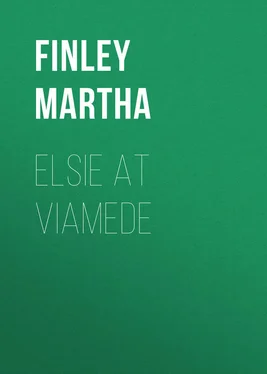Martha Finley - Elsie at Viamede
Здесь есть возможность читать онлайн «Martha Finley - Elsie at Viamede» — ознакомительный отрывок электронной книги совершенно бесплатно, а после прочтения отрывка купить полную версию. В некоторых случаях можно слушать аудио, скачать через торрент в формате fb2 и присутствует краткое содержание. Жанр: foreign_religion, foreign_antique, foreign_prose, foreign_children, на английском языке. Описание произведения, (предисловие) а так же отзывы посетителей доступны на портале библиотеки ЛибКат.
- Название:Elsie at Viamede
- Автор:
- Жанр:
- Год:неизвестен
- ISBN:нет данных
- Рейтинг книги:3 / 5. Голосов: 1
-
Избранное:Добавить в избранное
- Отзывы:
-
Ваша оценка:
- 60
- 1
- 2
- 3
- 4
- 5
Elsie at Viamede: краткое содержание, описание и аннотация
Предлагаем к чтению аннотацию, описание, краткое содержание или предисловие (зависит от того, что написал сам автор книги «Elsie at Viamede»). Если вы не нашли необходимую информацию о книге — напишите в комментариях, мы постараемся отыскать её.
Elsie at Viamede — читать онлайн ознакомительный отрывок
Ниже представлен текст книги, разбитый по страницам. Система сохранения места последней прочитанной страницы, позволяет с удобством читать онлайн бесплатно книгу «Elsie at Viamede», без необходимости каждый раз заново искать на чём Вы остановились. Поставьте закладку, и сможете в любой момент перейти на страницу, на которой закончили чтение.
Интервал:
Закладка:
"But they had been very brave," remarked Grace. "What a pity it was that they had to fight in such a bad cause. Were there very many of them killed, papa?"
"Yes, a great many. Of a regiment of brave Highlanders, with twenty-five officers, only nine officers and one hundred and thirty men could be mustered after the terrible fight was over. Another regiment had lost five hundred men.
"While this fighting had been going on, another of their divisions of nearly one thousand men, led by Colonel Rennie, attacked an unfinished redoubt on Jackson's right and succeeded in driving out the Americans there, but could not hold it long, being terribly punished by Humphreys' batteries and the Seventh Regiment. Yet Rennie succeeded scaling the parapet of the American redoubt. Beale's New Orleans Rifles poured such a tempest of shot upon the officers and men in the redoubt that nearly every one was killed or wounded. Rennie, who had just shouted, 'Hurrah, boys! the day is ours!' fell mortally wounded.
"And now this attacking column also fell back, and by hastening to the plantation ditches, sought shelter from the terrible tempest of shot and shell coming from Jackson's lines.
"General Lambert with his troops tried to come to the aid of Packenham, Gibbs, and Keane, but was able only to cover the retreat of their vanquished and flying columns."
"And the victory was won then, papa?" queried Lulu.
"Yes, though the battle had lasted but a short time; by half past eight a. m. the musketry fire had ceased, though the artillery kept theirs up till two o'clock in the afternoon."
"Were both Americans and British playing their national airs while the fight was going on, sir?" asked Walter.
"The British had no music but a bugle," replied the captain, "not even a drum or a trumpet; but all through the fight, from the time they sent up their first signal rocket, the New Orleans Band was stationed near the spot where the American flag was flying, playing national airs to cheer and animate our soldiers."
"Were not the British rather more successful in another part of the field, Captain?" asked Eva.
"Yes," he replied; "in their attack upon the troops on the right bank of the river, they being only militia and few in number; also fatigued and poorly armed. Morgan, their commander, was compelled to spike his cannon and throw them into the river, his men being driven from their intrenchments.
"Then Thornton, his assailant, pushed on to Patterson's battery, three hundred yards in the rear, and Patterson, threatened by a flank movement also, was compelled to spike his guns and flee on board of the Louisiana , his sailors helping to get her out of the reach of the foe.
"But Thornton soon heard of the disasters of his comrades on the other side of the river, and received orders to rejoin them. Jackson had sent four hundred men to re-enforce Morgan, but there was now no need of their services. Thornton re-embarked his troops at twilight, the Americans repossessed themselves of their works, and Patterson removed the spikes from his guns, put his battery in better position, and at dawn informed Jackson of what he had done by heavy firing upon the British outposts at Bienvenu's.
"In that battle of January 8, 1815, the British had lost twenty-six hundred men, seven hundred killed, fourteen hundred wounded, and five hundred made prisoners; while the Americans had only eight killed and thirteen wounded. Lossing tells us, 'The history of human warfare presents no parallel to this disparity in loss.'
"In Thornton's attack, the British loss was a little more than one hundred; the American, one killed and five wounded. On that side of the river the British secured their only trophy of their efforts to capture New Orleans. So Lossing tells us, adding, 'It was a small flag, and now [1867], hangs conspicuously among other war trophies in Whitehall, London, with the inscription: "Taken at the battle of New Orleans, January 8, 1815."'"
"That looks as though our British cousins must esteem it quite a triumph to be able to succeed in taking anything from Uncle Sam," laughed Rosie.
"Yes," said Walter, "I think they compliment us by making so much of that one little trophy."
"So do I," said Lulu. "Papa, is that the end of your story?"
"No, not quite," replied the captain. "After the battle had come to an end, Jackson and his staff passed slowly along his whole line, speaking words of congratulation and praise to his brave troops, officers and men. Then the band struck up 'Hail Columbia,' and cheer after cheer for the hero went up from every part of the line. The citizens also, who had been anxiously and eagerly watching the battle from a distance, joined in the cheering. Then, after refreshing themselves with some food (doubtless having gone into the battle without waiting to eat their breakfast), the soldiers set to work to bury the dead of the enemy in front of Jackson's lines, and take care of the wounded.
"General Lambert sent a flag of truce asking for an armistice in order to bury his dead, and Jackson granted it on condition that the British should not cross to the right bank of the river.
"The next morning, detachments from both armies were drawn up in front of the American lines, at a distance of three hundred yards, then the dead bodies between that point and the intrenchments were carried by the Americans upon the very scaling ladders left there by the British, and delivered to them. They were buried on Bienvenu's plantation, and, as Lossing tells us, the graves were still there undisturbed when he visited the spot in 1861. He says also that it is regarded with superstitious awe by the negroes in the neighborhood.
"The wounded who had been taken prisoners were carried to the barracks in New Orleans and tenderly cared for by the citizens. Some of the dead British officers were buried that night by torch light in the garden at Villere's; the bodies of others, among whom were Packenham, Rennie, and Gibbs, were sent to their friends in England."
The captain paused, and Violet said playfully, "I fear we are fatiguing you, my dear; suppose you leave the rest of your story for another time."
"And that we have some music now," added her mother, a suggestion which was immediately adopted, the whole party adjourning to the parlor.
CHAPTER III
The captain opened the piano and glanced smilingly at his young wife. But Violet shook her head playfully. "I think mamma should be the player to-night," she said. "She has scarcely touched the piano for months, and I am really hungry to have her do so."
"Will you give us some music, mother?" queried the captain, offering to lead her to the instrument.
"Yes," she returned laughingly. "I could never wilfully allow my daughter to suffer from hunger when in my power to relieve it."
"Patriotic songs first, please, mamma," entreated Walter, as she took her seat before the instrument. "I do believe we all feel like singing 'Hail, Columbia!' and the 'Star-Spangled Banner.' At least I do, I am sure."
"I presume we are all in a patriotic frame of mind to-night," she returned, giving him a smile of mingled love and pride as she struck a chord or two, then dashed off into "Yankee-doodle-dandy," with variations.
"Hail Columbia!" and "Star-Spangled Banner" followed, old and young uniting together with enthusiasm in singing the patriotic words, but still other voices were unexpectedly heard joining in on the concluding strains:
"That star-spangled banner, oh, long may it wave
O'er the land of the free and the home of the brave!"
"Oh, Cousin Molly and Mr. Embury! Dick, too! and Betty!" cried Violet, hurrying with outstretched hand toward the doorway into the hall, where the cousins stood in a little group looking smilingly in upon them. "Come in; I am delighted to see you."
Читать дальшеИнтервал:
Закладка:
Похожие книги на «Elsie at Viamede»
Представляем Вашему вниманию похожие книги на «Elsie at Viamede» списком для выбора. Мы отобрали схожую по названию и смыслу литературу в надежде предоставить читателям больше вариантов отыскать новые, интересные, ещё непрочитанные произведения.
Обсуждение, отзывы о книге «Elsie at Viamede» и просто собственные мнения читателей. Оставьте ваши комментарии, напишите, что Вы думаете о произведении, его смысле или главных героях. Укажите что конкретно понравилось, а что нет, и почему Вы так считаете.












